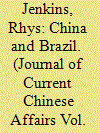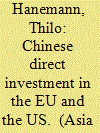| Srl | Item |
| 1 |
ID:
112545


|
|
|
|
|
| Publication |
2012.
|
| Summary/Abstract |
China's foreign policy has been characterized in the last decade by a heightened interest in reaching out to Latin America, particularly to countries rich in natural resources and with potential markets for Chinese exports, and Chile is one of these countries. The paper shows that even though the Chilean economy has benefitted from the signing of the FTA, it also faces potential risks. To continue to benefit, Chile needs to boost exports in other potential export sectors (value-added products or services) and should attempt to attract more Chinese FDI to Chile's export industry. The export of raw materials (particularly non-renewable ones) is not always sustainable in the long term. The roles of the Chilean state and the private sector in attracting Chinese investment and enhancing diversification of exports of value-added products are crucial for the future of the economy of Chile and its relationship with China.
|
|
|
|
|
|
|
|
|
|
|
|
|
|
|
|
| 2 |
ID:
112542


|
|
|
|
|
| Publication |
2012.
|
| Summary/Abstract |
The paper analyses the economic impacts of China's re-emergence on Brazil, looking at both the direct effects of China on Brazil in terms of bilateral trade and investment flows and the indirect effects through increased competition in export markets for manufactured goods and higher world prices for primary commodities. Despite a surge in Chinese FDI in Brazil in 2010, the main driver of bilateral relations is trade. While bilateral trade has grown rapidly, the pattern that has emerged has given rise to concern because Brazil's exports are concentrated in a small number of primary products while imports from China are almost entirely of manufactured goods that are becoming more technologically sophisticated over time. Brazil has benefitted in the short term from the high prices of primary commodities (partly caused by growing Chinese demand), but has lost export markets to China in manufactures, contributing to the "primarization" of the country's export basket.
|
|
|
|
|
|
|
|
|
|
|
|
|
|
|
|
| 3 |
ID:
129642


|
|
|
|
|
| Publication |
2014.
|
| Summary/Abstract |
Chinese outward foreign direct investment (OFDI) in developed economies has increased substantially in recent years, driven by policy liberalization and structural adjustments in China's economy. Efforts to accurately describe the dimensions of this increase are complicated by problems with official statistics and the complexity of deal structures. This article introduces the major problems of capturing data on global cross-border investment flows and elaborates on the particular difficulties of measuring Chinese outward FDI. It identifies alternative datasets that can help to better capture the scope and patterns of the Chinese overseas investment and uses one of them to describe the growth of Chinese investment in the EU and the US since 2000, highlighting similarities and differences in investment patterns in the world's two biggest economies.
|
|
|
|
|
|
|
|
|
|
|
|
|
|
|
|
| 4 |
ID:
129644


|
|
|
|
|
| Publication |
2014.
|
| Summary/Abstract |
This article explores the political challenges posed by the recent influx of Chinese outward foreign direct investment (OFDI) into the European Union (EU), which has become in 2011 the top destination for Chinese investment in the world. The central political question facing European states welcoming the influx of Chinese capital is whether this is a good bargain-a positive-sum game where both investor and investee benefit-or instead a Faustian bargain-a zero-sum game in the long term where capital is accompanied by implicit conditionality affecting European norms and policies, from human rights to labor laws. The novelty of Chinese FDI has the potential to affect politics in Europe in three different venues: inside European countries, between European countries, and between Europe and third countries. This article, whose main goal is to launch a research agenda on the political implications of Chinese FDI, explores in turn its potential impact on foreign and domestic policy, institutional process within the EU, and transatlantic relations
|
|
|
|
|
|
|
|
|
|
|
|
|
|
|
|
| 5 |
ID:
129640


|
|
|
|
|
| Publication |
2014.
|
| Summary/Abstract |
Though still a small percentage of the total stock of Foreign Direct Investment (FDI) present in European countries, FDI coming from China has risen dramatically in the European Union (EU) since 2009. This introduction to the special issue on "The Politics of Hosting Chinese Investment in Europe" examines the political fears aroused by this recent surge and by the prospect of continued Chinese direct investment in European economies. After surveying patterns of Chinese investment in the EU, this introduction asks what is distinctive about the potential economic and political consequences of Chinese FDI and lays out the argument for and against treating Chinese FDI as sui generis
|
|
|
|
|
|
|
|
|
|
|
|
|
|
|
|